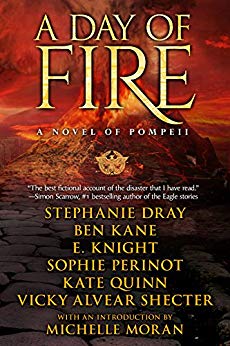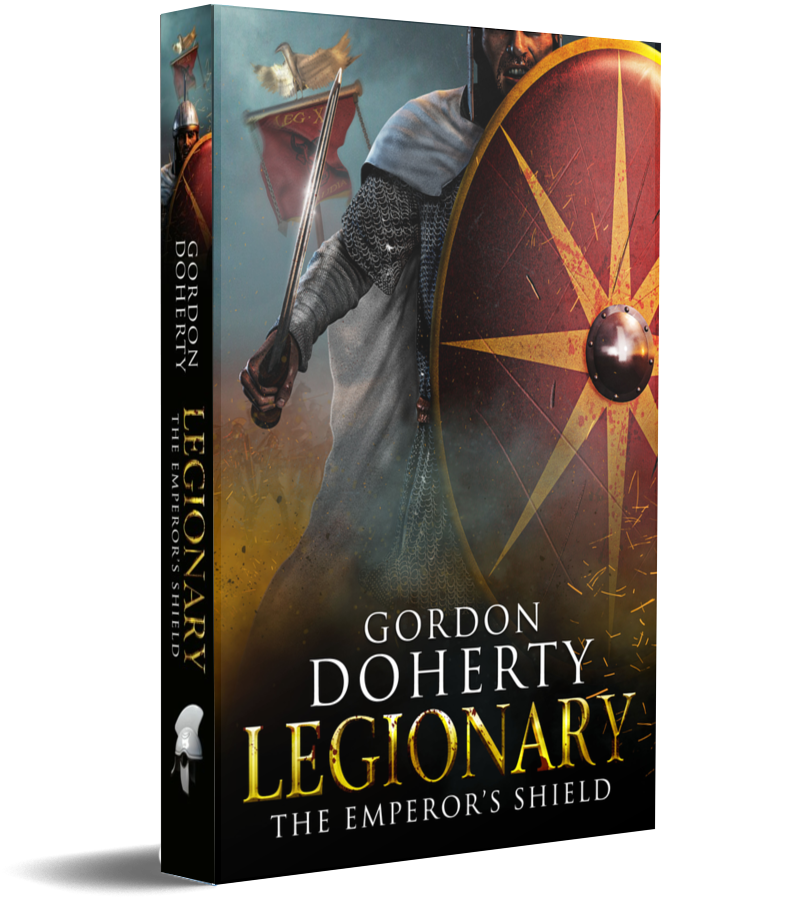|
A good few years back when I was mulling over what to do with my first ever novel manuscript, I thought it might be an idea to ask an expert. I glanced to my bookshelves and saw Ben Kane's 'Forgotten Legion', a recent read that had stuck in the mind and hoisted Mr. Kane to the upper echelons of my favourite authors. I got in touch with Ben and he was as helpful as could be, giving advice and pointers and, later on when my first book was published, reading and giving a thorough and constructive critique that has stood me in good stead since. So, when Ben offered me the chance to preview his latest work - A Day of Fire, a novel of Pompeii, written in conjunction with five fellow authors - I was only too happy to oblige. As the title might suggest, this book of short stories pivots around Pompeii's nadir under the shadow of Vesuvius. The slow, steady (and gradually intensifying) cadence of the strange tremors underneath the city provide a tense and ominous beat along which each story travels...gradually swallowing up each character's everyday concerns in a sharp metaphor for the physical fate that awaits them and the city. The authors take us right onto Pompeii's streets and perch us upon the shoulders of the ordinary and extraordinary who tread them: callow youths, reluctant brides, troubled veterans and gladiators, doomed yet defiant families, sullen senators and plucky, whip-tongued heroines. Like the falling ash, each tale layers more detail upon that established by the last, and at the height of Vesuvius' fury I could see the streets breaking up, the villas and temples crumbling, the great ash cloud descending. I could hear the screaming and anguish, feel the blistering heat on my skin and smell the stench of conflagration. In summary, A Day of Fire is a fine read for lovers of history or of pacy, engaging fiction. Fancy trying it for yourself? Of course you do! Just click here to have a look. The tale enlightened me on much of Pompeii's last days in a fashion that blended the expertise of the source and secondary texts with the enjoyment of rollicking fiction. It threw up a series of questions too, and Ben has kindly agreed to take part in a Q & A session to shed more light on my queries: Q&AGordon: There is a real passion for the subject matter that runs through and binds the six tales in 'A Day of Fire'. How would you summarise the shared dream of the authors for this project?
Ben: To depict, somehow, the ordinariness of those caught up in the eruption, and of how like us they were. To paint a picture that might reveal in part how utterly terrifying and awful that day in 79 AD must have been. Gordon: Did you set out to bring a fresh interpretation of the history and the legend of Pompeii's fate, or was it more about getting the historical detail down to a tee? Ben: For me, the latter. I’m no historian, just a teller of tales! Gordon: There were many scenes that stick in the memory: one was Rufus' dash through the ash cloud to try and save his friend, Mustius. The other was the epilogue (don't worry, no spoilers apart from the obvious one that the mountain erupted!), where one of the main characters was picking over the debris, many months after the disaster. Both of these scenes were really visceral, detailed and conveyed a deep sense of anguish - bravo! What were your main sources for these scenes? Ben: The Rufus scene was mine – and I worked on what we know of the eruption – its timeline, and what it would have been like in the town. I also tried to work in how – ignorant of science as they were – ordinary Romans would have regarded the fearsome, lethal display by Mother Nature. Gordon: I could have read this as an anonymous work and I'd have been unaware of the mix of female and male authors involved. Was this just a natural synergy or did you and your fellow writers have to alter any of your stories to blend the male and female voices? Ben: It must have been a natural synergy! We didn’t have to alter our stories other than to make sure our characters crossed paths at various stages etc. Gordon: I've been writing a joint project with a certain SJA Turney and I've found interweaving threads of plot with another hist-geek mind quite rewarding. I'm guessing you and the other authors of 'A Day of Fire' did too. I'm interested in how you managed to coordinate 6 unique minds to weave each tale together so well though? In particular, did you co-devise an overall plot and characters, then divide up into chunks and take a piece each, or did you each bring your ideas to the table and bind them into the epic it became? Ben: I look forward to your collaboration with Simon! We found it great fun. In one regard, I was lucky – I wrote my story long before anyone else – and to some extent, the others weaved their tales around mine. I then had to make some changes so that the whole thing came together, but that was fine. We had an overall idea about the plotline, yes, and the timeline, because otherwise we might all have written about the worst part of the eruption etc. Gordon: Will there be more from the Pompeii team? Ben: I hope so! Watch this space… Gordon: What's next for you? I hear there are rumblings from the Teutoburg Wald? Ben: Yes, indeed. I’ve just finished the first book in a new trilogy, called Eagles at War. It concerns the huge defeat suffered by the Romans in Germany, in AD 9, with the loss of 3 eagles…I’m in Germany as I type, researching book two. Gordon: Thanks, Ben - nice to chat with you as always! Ben: Many thanks for having me, Gordon! If you'd like to find out more about Ben or 'A Day of Fire', you can visit his website at: http://www.benkane.net/
0 Comments
Leave a Reply. |
AuthorGordon Doherty: writer, history fan, explorer. My Latest BookArchives
March 2023
Categories |




 RSS Feed
RSS Feed